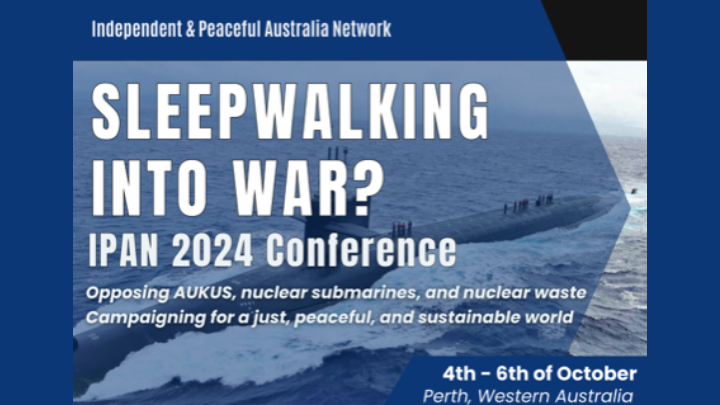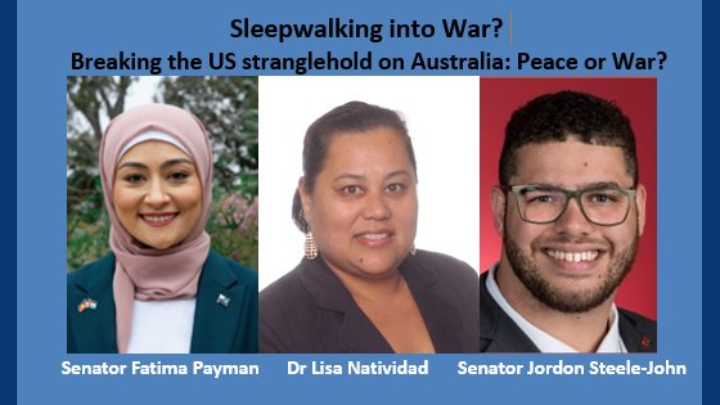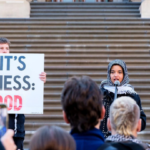Labor Must Stop Trade with Israel, Declares Senator Payman Ahead of the IPAN Conference

Helplessly bearing witness to the 12-month-long wholesale slaughter in Gaza has taken its toll on the Australian constituency, especially those who have relatives trapped at the site of the genocide, and this is only being compounded by the actions of the Albanese government.
The mass obliteration of humanity in the Gaza Strip, along with all the norms of international warfare, not only continues on unabated, but last week, when it came to a UN resolution calling on Israel to end its occupation of Palestinian territory within the next 12 months, Australia abstained.
After pounding the Palestinians of Gaza for the last year, the Netanyahu government over past weeks has turned its gaze towards Lebanon and it began attacking the south of that country earlier this week, using the same tactics and ferocity that its subjected those in the Strip to for the past year.
And in addressing the UN Security Council on Friday, foreign minister Penny Wong called for a ceasefire in Gaza and Lebanon, while PM Anthony Albanese too called for the same in regard to Lebanon, but many consider this too little too late, especially as Israel isn’t even listening anymore.
The 51st US state
But while the constituency is grappling with the reality that we’re supporting the rogue state of Israel as it attempts to destroy any sense of shared humanity around the globe, there is another more hidden development taking place on this continent in terms of the AUKUS pact.
The tripartite agreement between the US, the UK and Australia has a public focus on us acquiring eight nuclear-propelled submarines (SSN), but it also has a less discussed aim of permitting the US to station its own SSN presence in WA, as well as to park nuclear-capable B-52 bombers in the NT.
These developments are gearing us up to a US-led war on China, which Australia is set to follow the leader into, as by the time it kicks off, Washington will have such a local presence that it can run much of the war from here, and it will also have the ability to withdrawal from here completely.
Indeed, as the Independent and Peaceful Network Australia (IPAN) describes the current situation, it is as if we’re simply sleeping walking into war, and that’s why the 2024 IPAN Conference set to take place in Boorloo-Perth next weekend, has taken this as its theme.
Speaking truth to power
Independent WA Senator Fatima Payman will be speaking at the opening forum of the IPAN conference. And that’s the same senator who in May brought comfort to many when, as a member of the Labor government, she broke party rank to publicly name the catastrophe in Gaza a genocide.
Payman didn’t stop there though, as she went on to cross the floor to vote in favour of a motion to recognise Palestine, which has been on Labor’s policy platform since 2021. And for this, she lost her position in Labor, but it has also meant that the nation has gained a fiercely independent voice.
Sydney Criminal Lawyers spoke to Independent WA Senator Fatima Payman about Labor’s form on Gaza since she left its ranks, the exorbitant costs the nation is facing financially and socially by blindly following US lead, as well as her vision of our nation as an independent rights-forward middle power.

Earlier this year you brought a sense of relief to great numbers of the constituency when you dared to speak out against the official Labor Party line to declare that what we have been witnessing in horror for the last 12 months in Gaza is a genocide.
But now, the Netanyahu government has commenced a full-scale military attack upon southern Lebanon, and it appears to be using the same strategy it’s taken in Gaza.
Senator Payman, how do you consider what’s occurring now in terms of Israel attacking Lebanon?
This is what happens when you give a so-called friend absolute impunity and the greenlight to continue to conduct itself in a manner that’s contrary to international humanitarian law.
What we are seeing is the Netanyahu government gone rogue, and not only wreaking havoc in Gaza but now in Lebanon and using tactics that breach international humanitarian law through the exploding pagers, as well as indiscriminately killing so many civilians.
How do they get away with it? It blows my mind. How does Australia still turn a blind eye? And how are we still putting out these bland statements, with no condemnation at all?
It is almost like these pagers exploded out of nowhere. There was no robust reprimanding of the state of Israel over this action.
They’ve been pandering to the Australian community by calling for a ceasefire and stating that this is in no one’s interest – but this hasn’t been in anyone’s interest over the last 12 months.
Over 41,000 Palestinians have been killed. Israel now wants a distraction because they have clearly not obtained their objectives in Gaza, so now they need to pick a fight with someone else, so that they can prolong what they’re doing and justify this ongoing slaughter of innocent people.
We would love to see stronger measures and bolder statements from the Australian government. And I am just so grateful to now be able to speak out and call a spade a spade.
The real culprits, the real oppressors here, are occupying Palestine and are now on the brink of starting a regional war that we cannot afford, and the death toll and collateral damage will be great.
The need to speak out about Gaza is the reason why you crossed the floor in relation to a Greens motion on recognising the state of Palestine in June, and it’s why you’re now an independent senator in Australian parliament.
The position taken by Labor on Gaza appears to have progressed since that time to some measured handwringing about civilian casualties.
In your opinion, has the government shifted towards a better position in terms of Israel since you’ve been an independent? And how do you consider it should be operating in this regard at present?
The government has realised that we are creeping toward a regional war if stronger measures are not taken. So, the language is changing slightly – but not changing enough.
At this point, I don’t think simply changing the language is going to suffice. We need to see a stronger call for a permanent ceasefire. And not just a humanitarian ceasefire or a temporary pause.
This is about civilians getting caught up in the crossfire and the Labor Party needs to put a stop to trade with Israel and send a stronger, clearer message.
Labor needs to recognise the state of Palestine. And when it comes to a solution, they need to ensure that the people making these decisions are those involved.
So, the people of Palestine and Israel need to be making these decisions, not Australia or the US.
The Labor government is just fence sitting. They have had so many opportunities to recognise the state of Palestine. And then most recently, we had the UN resolution vote, which for Australia to abstain, was just a slap in the face.
This is despite the findings of the International Court of Justice, which acknowledged the violations of international law by Israel in its illegal occupation.
It would have been such a massive turning point in terms of restoring hope and peace on our shores, in our streets and in our communities, as well as for people in our communities who have got family in Gaza and Lebanon.
But instead, what we saw was Australia abstaining. We couldn’t see ourselves to be on the right side of history. And I wonder where that bold courageous leadership is.
We think about Labor giants, like Gough Whitlam, Bob Hawke and Paul Keating, who would not refrain from making such a bold decision, even if it would be unpopular at the time, because it would be for the right reasons.
This is a humanitarian crisis unfolding before our eyes and the more we turn a blind eye, the worse it gets, and the more people are killed, and we then become complicit in it through our inaction and silence.
I am going to keep urging, whether that is through communities, social media or writing directly to the ministers, to say this is not good enough.
How many are to be killed before we say enough is enough? I’ve been saying this since May. And there have been advocates around the country who have been loudly protesting since 8 October last year.
It just blows my mind, how we can travel down the same trajectory expecting a better outcome.
Didn’t Einstein call that insanity, when you do the same thing again and again and expect a different outcome?
So, what sort of effect would you say this is having on the local community?
People are outraged. They have absolutely lost trust in the current government.
When I was in the Labor government, I used to talk about this during caucus meetings and during one-on-ones with various ministers. People are leaving the Labor party. They are becoming disenfranchised.
People are fuming that in opposition Labor was so loud and we opposed the occupation. We had shown so much bravery, courage and outrage.
But now that Labor is in power, and they finally have that opportunity to make a difference and be the human rights champions that they claim to be, instead they’re choosing to weasel out with empty statements that have no weight, gravitas or impact upon the so-called friend of Australia, Israel, and I don’t know how they expect to fare well when it comes to the upcoming election.
You’re speaking at the opening night forum of the 2024 Independent and Peaceful Network Australia (IPAN) conference on 4 October, which is being held at Perth City Library, and it will have a focus on the other issue regarding warfare that’s of prominence right now, which is the AUKUS.
Ever since the announcement of the AUKUS optimal pathway in March last year, there have been mounting doubts cast over whether the submarine deal will ever eventuate, as well as warnings raised about Australia relinquishing sovereignty.
The theme of the conference is “sleepwalking into war”. So, how do you consider the prospect of the AUKUS pact and all the trappings it entails?
There are so many factors that don’t sit well with me, especially when it comes to Australian sovereignty.
We are relying on the US for the maintenance of these submarines, which essentially means that Australia loses its independence to manage its own defence.
So, what happens if the priorities of the US shift, or there is a change in US politics, as we are now seeing? What if the US becomes distracted? Where does that leave us?
We shouldn’t be tied to an ally that we can’t always rely on. And this is also a $368 billion deal in the middle of a cost-of-living crisis. And Aussie families are struggling to keep up with bills. This is not the right way to be using taxpayer money.
Even a fraction of the $368 billion could be used to fund things like affordable homes and ease the cost of living. Some of the submarines aren’t supposed to arrive for 20 or 30 years and that is decades of uncertainty.
How do we know that there isn’t going to be a potential budget blowout, when it comes to costs accumulated over these decades?
There are the environmental costs. We haven’t used nuclear technology like this before. And there are risks involved because we have never had these sorts of nuclear facilities of our own before.
There are better alternative options for defence that we could be investing in like cybersecurity, satellite technology and preparing ourselves for modern warfare, not with submarines that won’t be here for decades.
We keep claiming to be an independent nation. But how are we boosting that independence if we are relying so heavily upon the US and giving them more control over our security?
We need to have full control over our defence capabilities and over our foreign policy. And we need to be focused on building stronger ties in the Indo Pacific, rather than gearing up for a war that shouldn’t even be entertained.

You’re a senator representing Western Australia, and AUKUS Pillar I has a particular focus on establishing a US-UK rotational nuclear-propelled submarine force on Garden Island, off the coast of Perth. And this will also entail the storage of low and intermediate grade nuclear waste.
Do you consider there’s enough consultation going on with the WA public about what’s happening in its jurisdiction? And what are your thoughts about the imposition of US subs patrolling local waters?
In listening to people during my 12 towns in 12 days tour, many WA constituents were concerned and felt like this is being rushed and that they didn’t have a say in it.
The deal was made under the former Liberal Nats coalition and Scott Morrison. Albanese had to then deal with it and he’s continuing to entertain the different phases of it.
West Australians have serious concerns. And it would be pertinent for the government to have open consultations to alleviate people’s concerns.
I know that especially in the electorate of Fremantle, which is close by Garden Island, people are worried, and they can’t fathom that we would be subjecting ourselves to this and putting Australia’s sovereignty and environment at risk.
This is attracting negative attention rather than making sure that we are using diplomatic means to strengthen ties within the Indo Pacific region.
The government needs to do more. The idea of US subs patrolling our local waters is something that freaks many West Australians out.
And lastly, Senator Payman, the IPAN conference will not only have a focus on the issues of rising militarism, but it will also reflect on alternatives in which Australia could become an independent and peaceful nation no longer dependent on the US and mimicking its foreign policy outlook.
So, as an Australian senator, what is your vision for the future of Australia in this regard?
Wouldn’t it be a dream to have an Australia that is an independent and peaceful nation with its own foreign policy and control over its own defence capabilities, as well as a nation that protects human rights and is an example of what it means to be a champion of rights, diplomacy and peace.
In the trajectory that this modern society is heading towards, we cannot afford another war. But we need to be prepared with modern warfare capabilities to safeguard everything within our borders.
We are an island nation surrounded by water. But at the same time, we cannot simply ignore or turn a blind eye to technological or cybersecurity threats.
So, I do hope that with strong and brave leadership, Australia can start charting its own path and becoming a world leader among the other world powers, as an example for what it means to be an independent and peaceful nation and as an example for other nations to follow.







